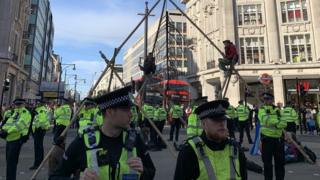 Image copyright Nathan Williams / BBC News
Image copyright Nathan Williams / BBC News A police ban on Extinction Rebellion protests in London last month was unlawful, High Court judges have ruled.
The Metropolitan Police imposed the ban, which prevented two or more people from the group taking part in protests, under the Public Order Act.
Butjudges have ruledthat police had no power to do this because the law did not cover “separate assemblies”.
Lawyers for the group described the police action as “hastily imposed and erratically applied “.
They say the Met Police now faces claims for false imprisonment from” potentially hundreds “of protesters.
Protests cost £ 24 m to police and resulted in 1, 828 arrests, with 165 people charged with offences, the Met says.
During the court hearing, the force had argued that the ban was the only way to tackle widespread disruption.
Announcing their judgement, however, Lord Justice Dingemans and Mr Justice Chamberlain ruled in favor of Extinction Rebellion.
Lord Justice Dingemans said: “Separate gatherings, separated both in time and by many miles, even if co-ordinated under the umbrella of one body, are not a public assembly within the meaning of … the Act.
“The XR [Extinction Rebellion] autumn uprising intended to be held from October 14 to 19 was not therefore a public assembly … therefore the decision to impose the condition was unlawful because there was no power to impose it under .. . the Act. “
The judges noted that there are powers within that act which may be used lawfully to” control future protests which are deliberately designed to ‘take police resources to breaking point “‘.
During 10 days of climate change protests last month, activists shut down areas around Parliament and the Bank of England, and targeted London City Airport.
Police had tried to restrict them to Trafalgar Square , under Section 14 of the Public Order Act.
The court was told that the ban was issued on the same day as a message posted online by London activists on 14 October.
It told protesters to adopt the “be water” tactics used by demonstrators in Hong Kong.
“Be water, crowds split up into fast moving groups and pairs, that network via phones,” it said.
“You gather at particular spots in large numbers, until the police response building then you move to a new disruptive site.”
The ban was lifted four days later, with officerssaying that it was no longer necessarybecause demonstrations had ended.
Analysis
BBC home affairs correspondent Daniel Sandford
This was a radical tactic adopted by the Metropolitan Police on 14 October – banning all future Extinction Rebellion protests across London for several days.
But it has backfired. No police force likes to have their actions described as “unlawful”.
Today’s High Court ruling takes away from officers the ability to impose a city-wide ban of future protests, which means demonstrators wanting to be “like water” – where they split into fast-moving groups – will be difficult to control if they are trying to disrupt a whole city.
So police will have to deal with what is in front of them.
If a specific protest in a specific place gets out of hand they will be able to close it down, but it will have to be a decision made by an officer on the spot, and not by someone sitting in a police station worrying about what protests may happen the next day.
During the court hearing, Phillippa Kaufmann QC, for Extinction Rebellion, told court the police ban had been “wholly uncertain, an abuse of power and irrational “.
Responding to the ruling, Extinction Rebellion UK tweeted” we won’t be silenced “.
Green Party peer Jenny Jones – who was among those to bring the legal challenge – described the legal win as “historic”.
Speaking outside the court, she said: “The police can over-step the mark. The police are getting more and more strong powers that they are misusing – and that’s absolutely unacceptable. “
What does Extinction Rebellion want?
Extinction Rebellion’s legal victory follows two weeks of protests in the UK last month.
The group (XR for short) wants governments to declare a “climate and ecological emergency” and take immediate action to address climate change.
It describes itself as an international “non-violent civil disobedience activist movement”.
Launched in 2018, organizations say it has groups willing to take action in dozens of countries .
It uses an hourglass inside a circle as its logo, to represent time running out for many species.
Jules Carey, a solicitor representing protestors, said the ban had been “hastily imposed” and “erratically applied”.
He said: “The police have powers to impose conditions to manage protests but not to ban them.
“This judgement is a timely reminder to those in authority facing a climate of dissent – the right to protest is a long-standing fundamental right in a democratic society that should be guarded and not prohibited by overzealous policing. “







GIPHY App Key not set. Please check settings